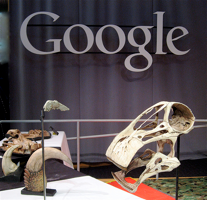 by tibchris
by tibchris
Samsung Galaxy smartphones banned from sale in Europe in Apple suit
[Via AppleInsider]
A Netherlands judge ruled on Wednesday that Samsung’s Galaxy S, Galaxy S II and Ace smartphones are in violation of Apple patents, and ordered an injunction against sales of the devices across the European Union.
[More]
No Galaxy tablets in Germany and now no Galaxy smartphones in the Netherlands and perhaps all of Europe.
Copying Apple may not have been a good business strategy. Are people going to buy a tablet/smartphone that might be orphaned any time soon, much like the HP tablet was?
It demonstrates the important aspect of creating your own niche and gaining the increasing returns that derive from that. Apple’s lead, deriving from the novel ecology it created, continues to provide ways for it to not only protect that lead but increase it.
Samsung has no fundamental answer for the question of why it is selling a tablet. It is simply trying to draw away some of the success from Apple, gaining some money. There is simply no other compelling reason for the existence of its smartphones or tablets.
In a market based on positive feedbacks, this is a negative solution and will be doomed to longterm failure. Apple, in some ways, is playing a non-zero game with the ecosystem it has created while Samsung and others such as Google are still playing the Industrial Age zero sum games.
Apple’s ecology is self-sustaining. Sales of the iPhone drive use of the App store which drives sales of music which drive sales of the iPhone which drive sales of the iPad which drives sales of music from the App Store which drive sales of Apps which drive sales of the Macbook Air which drives sales of apps from the App store which drive sales of the iPhone and so on.
An ecology that is enhanced by positive feedback, each part supporting the enhanced use of each other. As each increases it bootstraps the increased use of all the other parts.
No other company has this ecology. None are trying to create one. They simply slavishly copy one part, looking to negatively impact only one art of the ecology. But that part of the ecology is positively supported by all the other ones so a negative impact is completely minimized.
Apple has created the most robust ecological system for its products perhaps in human history. This ecology permits it to continue to enhance the products in a set pf positive returns while everyone else is fighting in an ecology based on negative returns.
Arthur’s paper, written as Jobs took over Apple, has worked as a blueprint to describe just what Apple has become.
Other companies would have greater success if they followed the important principles discussed in that paper. Better than just copying Apple.
 by
by